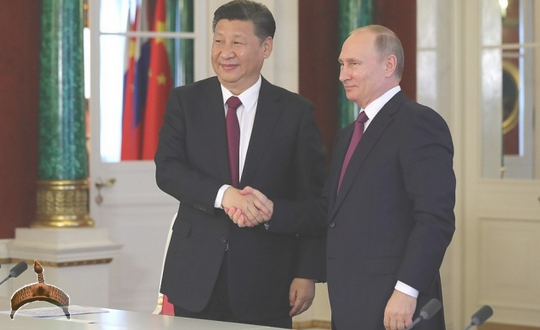by Ghassan Kadi for The Saker Blog
When Chinese Defence Minister, General Wei Fenghe visited Moscow on the 4th of April 2018 and made his historic comment that he was in Moscow to give a message to America that China stands by Russia (http://www.abc.net.au/news/2018-04-04/chinas-new-defence-chief-visits-russia-to-send-a-message-to-us/9616216), he put China in a new and unprecedented global position, because China had never made such direct statements about the USA since the early days of Chairman Mao; and that was a long time ago, when China was not an industrial power and an aspiring global power, and long before the rift between the USSR and Mao’s China began.
A lot has changed since, and neither Russia nor China are today what they used to be a few decades ago, and as they changed, matured and developed, their relationship vis-à-vis each other and the United States seem to have gone the full circle.
Today’s China and Russia are friends and allies; not only by the virtue that they both are desirous to change the unipolar so-called “New World Order” status of the world, but also because they have a huge number of issues that unite their national interests.
According to a Sputnik interview with Ekaterina Blinova on the 5th of April 2018, “Wall Street analyst Charles Ortel argues that the Chinese Petroyuan can’t compete with the Petrodollar as long as China is not a major energy producer” https://sputniknews.com/analysis/201804051063248574-petroyuan-petrodollar-economy/
In reality however, the Petroyuan does not need Chinese oil any more than the Petrodollar needed American oil to be underpinned with. The Petrodollar rode on the back of Saudi oil, and even though America had always been Saudi Arabia’s master and custodian ever since the inception of the Al-Saud legacy, it was not an easy partnership given that the Middle East by-and-large, and Saudi Arabia in particular, are very volatile regions of the world that can at any time implode or explode, leaving old alliances and business agreements and interests in tatters.
As a forethought, we can only expect China and Russia to have a much more stable relationship than that between the USA and Saudi Arabia, and this can be achieved at different levels; militarily, strategically, and economically among other things. Most relevant to this current context is the issue of the potential of the Petroyuan.
With China’s rising economic power that has already surpassed that of the USA on Purchasing Power Parity (PPP) basis, China finds in Russia the perfect oil-gas producing partner to give the Petroyuan the proper and stable underpinning it needs to compete with the Petrodollar and replace it as the safe and rightful bid for oil futures.
And if this is not enough, both China and Russia have been accumulating gold, tens of tons of physical gold, the exact amounts of which no one really knows.
It would be foolhardy to imagine that an American/Saudi Petrodollar, unbacked by gold and/or a strong American economy, unbacked by clear and known actual amounts of Saudi reserves, would be able to compete against the rising Chinese-Russian gold-backed Petroyuan in these uncertain and unchartered economic times.
The future of the Petroyuan alone is one very good reason for China therefore to form a solid alliance with Russia.
And now that China has already launched the Petroyuan, then in doing so, it has signaled the economic no-return-point with America, because in the eyes of America, the Petroyuan is now seen as an existential threat that must be destroyed.
Huge as it is potentially, there is much more that unites China with Russia than just the future of the Petroyuan.
Russia is the world’s richest nation in natural resources, and this is not only restricted to fossil fuel and mineral resources, but this also includes fresh water. The potential for agricultural development therefore in Russia is huge. And we have seen how in a few decades, Russia moved on from a net wheat importer to the largest global producer and exporter. On top of all of this, Russia is a highly developed nation with unrivalled military technology.
As a matter of fact, singularly China or Russia alone constitutes a match for America’s prowess and hegemony, one that remained unchallenged ever since the collapse of the USSR.
Ever since the end of WWII, America has embarked on the journey of flexing the muscles of a superpower on much smaller and less advanced nations. To this effect, it shamelessly and bullishly ravaged Korea in the 1950’s. And if this wasn’t enough, America managed to round up the whole United Nations behind its so-called “police action” to subdue the poor and underdeveloped nation of Korea.
But even with all odds stacked up against Korea, America only managed a partial victory, one that was followed by sheer and utter humiliating defeat in Vietnam and lesser humiliations elsewhere later on. In reality however, America has never scored a single post WWII victory in any of the wars it got involved with, and this is not to forget that it has been in a perpetual state of war, against one “enemy” or another, almost continuously ever since WWII has ended.
This brief historic narrative is not meant to tell readers a story they do not already know, but rather to emphasize how Russia and China do, or should, look at this recent American history from a perspective that joins them at the hip.
The “problem” here, if there is any, is that China is a very old nation that has its ancient traditions when it comes to both diplomacy and inter-relationships with other nations. Russia on the other hand, is a younger nation that is geographically more so a part of Europe, and closer to it culturally than China.
China has always been a sole operator, and a nation that is more pragmatic in its outlook than being colonialist and militarily expansive. China seems to naturally and spontaneously follow Sun Tzu’s rules of the art of war, and knows how to win a fight without fighting. Today’s China is more interested in creating overseas markets than colonies. It is therefore in China’s interests to keep Western economies afloat and Western consumers affluent.
But China is becoming increasingly aware that the level playing field that Western free trade agreements espouse is tilted and biased to serve Western interests. If this alone is not enough to send China sceptical about the prospects of its economic future with the West, it can see that the Western economy is on the decline, despite its own efforts to keep it afloat. In other words, in the long term, China realizes that it must develop other markets in developing nations.
The irony here is that the West has grown so dependent on Chinese-made goods, and this ranges from American-designed iPhones to T-shirts. To put it simply, without Chinese imports, the average American consumer will find empty supermarket shelves.
Without claiming that all fresh food on Western supermarket shelves is produced in the West, with the exception of fresh food however and certain special products such as French wine, Scotch Whisky and German-made cars, most manufactured items in America and the whole West are now made in China. For this reason, for President Trump to think that he can win a trade war with China, he has to delve deeply and realize what would happen to America if China decides to ban all exports to America for just one mere solitary week.
As a matter of fact, and this shouldn’t come as a surprise, America actually uses Chinese-made products in its military. This Google link lists a whole number of them:
https://www.google.com.au/search?q=america+used+chinese+made+products+in+its+ilitary&ie=&oe=
What needs to be kept in mind also is that much of America’s economy, its growth or otherwise, is based on its performance as a reseller of Chinese imports. Any growth in this sector is therefore a win for China.
With its pragmatic outlook at the world, China would be now perhaps beginning to grow cynical about its long term prospects with the West, and the American military intimidations in the South China Sea on one hand, and Trump’s trade sanctions on the other hand, would only be intensifying this sentiment.
To move the power base of the world economy from the West to Eurasia is not an easy task and fix that can be done overnight; and both Russia and China are aware of this. This alone is another reason why Russia and China need to develop the Silk Road network and develop the economies of a region that is inhabited by nearly half of the entire world population. After all, put it this way, if in a few decades Eurasia develops and the average consumer reaches economic parity with the average Western consumer, Eurasian economies would not then need Western consumers, would they?
The bottom line here is that China’s global policy of pragmatism ought to take a shift. China may have current and short term interests with the West and America in particular, but its future is with Eurasia.
In the world of big-fish-eats-small-fish, when Japan’s economy was booming, it is arguable whether Japan’s self-imposed geopolitical isolation was a contributing factor to its eventual downfall. China is clearly taking a different path to that of Japan and is actively engaged in strengthening its military. To this effect, if China wants to be the superpower it aspires to be, it can no longer restrict its global influence to making shy UNSC vetoes.
If Trump’s tweets about threatening Russia eventuate into action, Russia will be able to deal with the military threat alone, but China will need to walk the talk of its Defence Minister, General Wei Fenghe at some capacity or another.
When the US-led UN coalition invaded Korea back in the 1950’s, Chairman Mao sent one million Chinese troops into Korea. This did not stop the “police action”, but it disabled it from achieving the resounding success it was seeking. President Xi Jinping must walk in the shoes of his predecessor. China can put an end to the potential Western aggression against Russia and Syria and avert a potential global catastrophe simply by announcing the deployment of its aircraft carrier Liaoning into the Mediterranean. No Chinese message could be louder and clearer.
 Ọmọ Oòduà Naija Gist | News From Nigeria | Entertainment gist Nigeria|Networking|News.. Visit for Nigeria breaking news , Nigerian Movies , Naija music , Jobs In Nigeria , Naija News , Nollywood, Gist and more
Ọmọ Oòduà Naija Gist | News From Nigeria | Entertainment gist Nigeria|Networking|News.. Visit for Nigeria breaking news , Nigerian Movies , Naija music , Jobs In Nigeria , Naija News , Nollywood, Gist and more









